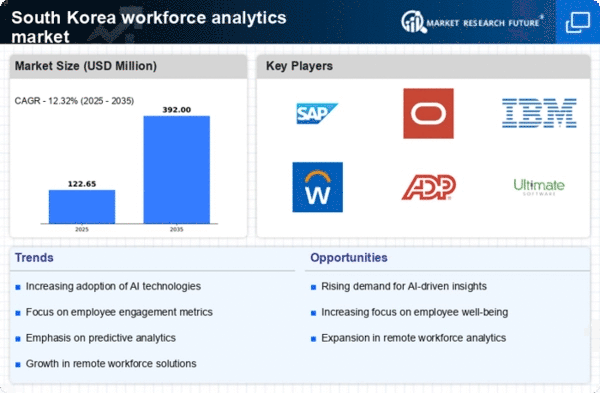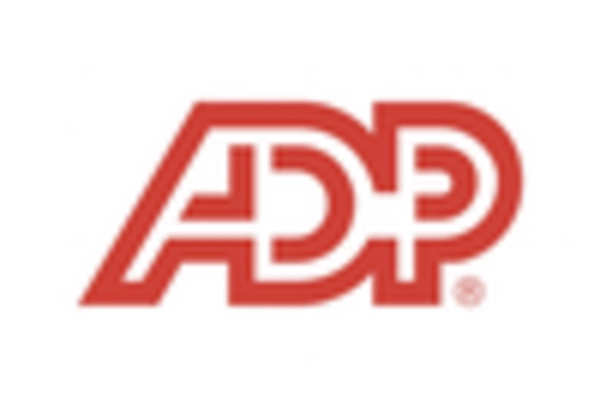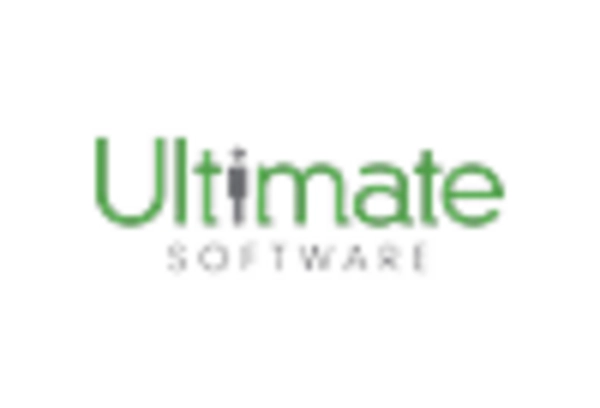Growing Emphasis on Talent Management
In South Korea, the increasing focus on effective talent management is propelling the workforce analytics market. Organizations are recognizing the importance of attracting, retaining, and developing talent to maintain competitive advantage. Recent studies indicate that companies investing in workforce analytics for talent management have seen a 20% improvement in employee retention rates. By utilizing analytics, businesses can identify skill gaps, assess employee performance, and tailor development programs to meet individual needs. This strategic approach not only enhances employee satisfaction but also contributes to a more engaged workforce. Consequently, the workforce analytics market is likely to witness sustained growth as organizations prioritize data-driven talent management strategies to foster a high-performing workforce.
Regulatory Changes and Compliance Needs
The evolving regulatory landscape in South Korea is a significant factor influencing the workforce analytics market. Organizations are facing increasing pressure to comply with data protection regulations and labor laws, necessitating the use of analytics to ensure compliance. Recent legislative changes have prompted companies to invest in workforce analytics solutions that facilitate accurate reporting and monitoring of employee data. It is estimated that compliance-related investments in workforce analytics have surged by 18% over the past year. This trend underscores the importance of utilizing analytics to navigate complex regulatory requirements while safeguarding employee information. As compliance needs continue to grow, the workforce analytics market is poised for expansion, driven by the demand for robust solutions that address these challenges.
Rising Demand for Remote Work Solutions
The shift towards remote work arrangements in South Korea is significantly influencing the workforce analytics market. As organizations adapt to flexible work environments, there is a growing need for analytics tools that can monitor employee performance and engagement remotely. Data suggests that approximately 30% of companies are now utilizing workforce analytics to track productivity in remote settings. This trend highlights the necessity for businesses to implement effective monitoring systems that ensure accountability while supporting employee autonomy. The demand for such solutions is expected to drive innovation within the workforce analytics market, as companies seek to optimize their remote work strategies and maintain operational efficiency.
Increased Focus on Diversity and Inclusion
Fostering diversity and inclusion within the workplace is emerging as a crucial driver for the workforce analytics market in South Korea. Organizations are increasingly utilizing analytics to assess their diversity metrics and implement strategies that promote an inclusive culture. Reports indicate that companies leveraging workforce analytics for diversity initiatives have experienced a 25% increase in employee satisfaction. By analyzing demographic data and employee feedback, businesses can identify areas for improvement and develop targeted programs to enhance diversity. This focus on inclusivity not only strengthens organizational culture but also enhances overall performance, thereby contributing to the growth of the workforce analytics market.
Technological Advancements in Data Analytics
The rapid evolution of data analytics technologies is a primary driver for the workforce analytics market. In South Korea, organizations are increasingly leveraging advanced analytics tools to derive insights from employee data. This trend is evidenced by a reported growth of approximately 15% in the adoption of analytics solutions among businesses in the past year. Companies are utilizing these technologies to enhance decision-making processes, optimize workforce management, and improve overall productivity. The integration of sophisticated algorithms and machine learning capabilities allows for more accurate forecasting of workforce needs, thereby enabling organizations to align their human resources strategies with business objectives. As a result, the workforce analytics market is expected to expand significantly, driven by the demand for innovative data-driven solutions that enhance operational efficiency.

















